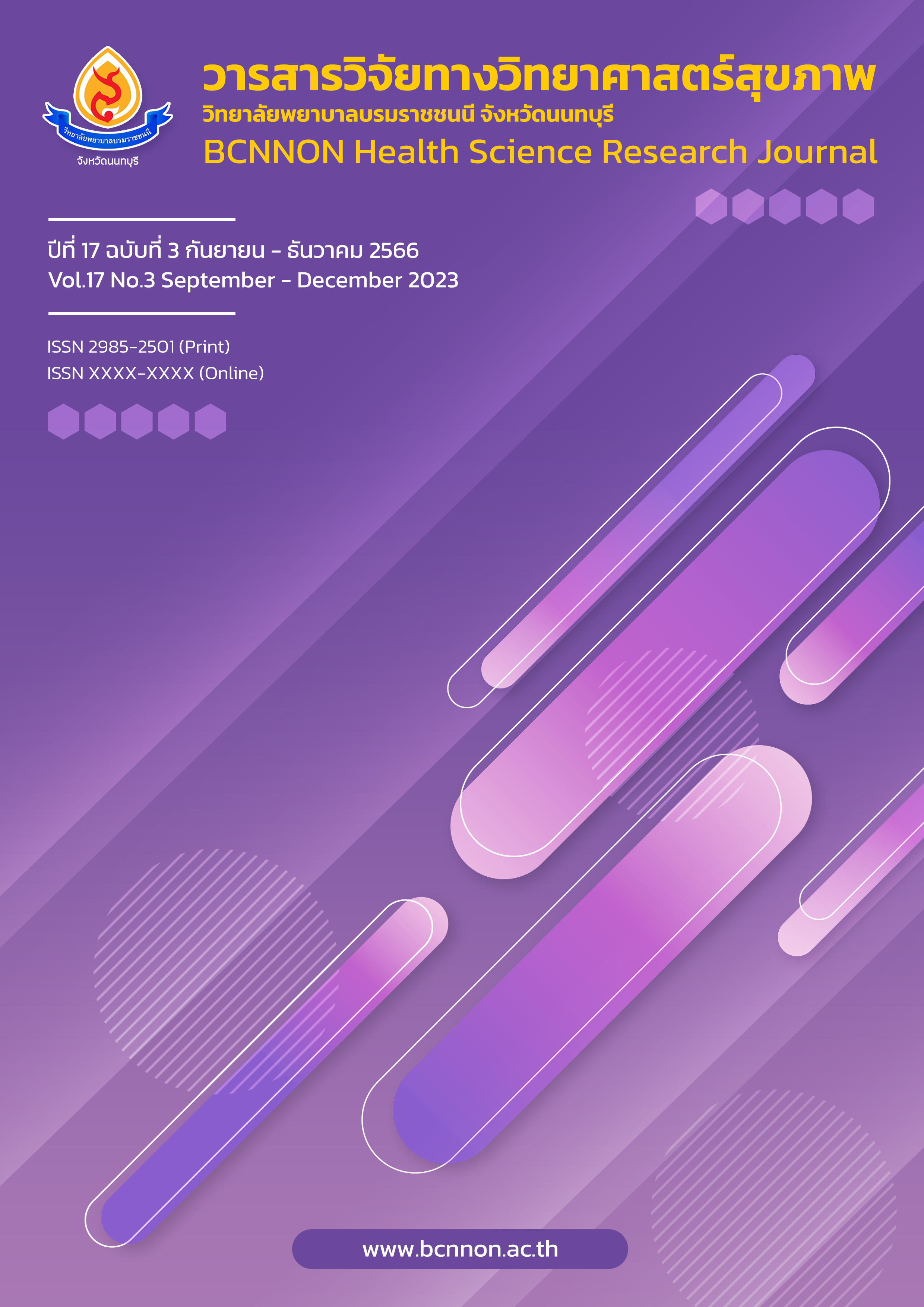การพัฒนารูปแบบการส่งเสริมการปรับตัวของผู้ดูแลผู้ป่วยโรคไม่ติดต่อเรื้อรัง ในชุมชนเขตเทศบาลนครลำปาง
Main Article Content
บทคัดย่อ
บทนำ : ผู้ดูแลผู้ป่วยโรคไม่ติดต่อเรื้อรัง จะต้องปรับตัวต่อการดูแลผู้ป่วยและอาจเกิดผลกระทบจากการปรับตัวที่ไม่เหมาะสมในด้านร่างกาย จิตใจ และสังคม หากผู้ดูแลฯ ไม่สามารถปรับตัวได้จะทำให้เกิดปัญหาต่อการดำเนินชีวิต เกิดความเหนื่อยล้า จนส่งผลให้ไม่สามารถดูแลผู้ป่วยได้
วัตถุประสงค์การวิจัย : 1) เพื่อพัฒนารูปแบบการส่งเสริมการปรับตัวของผู้ดูแลฯ และ 2) เพื่อศึกษาประสิทธิผลของการใช้รูปแบบการส่งเสริมการปรับตัวของผู้ดูแลฯ
วิธีการวิจัย : การวิจัยและพัฒนา แบ่งเป็น 2 ระยะคือ ระยะที่ 1 การพัฒนารูปแบบการส่งเสริมการปรับตัวของผู้ดูแลฯ ตัวอย่าง คือ 1) ผู้ดูแลผู้ป่วยโรคไม่ติดต่อเรื้อรัง จำนวน 138 คน และ 2) บุคลากรสุขภาพที่เชี่ยวชาญการดูแลผู้ป่วยโรคไม่ติดต่อเรื้อรัง จำนวน 12 คน เครื่องมือวิจัยคือ แบบประเมินระดับการปรับตัว แบบบันทึกสนทนากลุ่ม และแบบประเมินความเป็นไปได้ของรูปแบบ ระยะที่ 2 ศึกษาผลของการใช้รูปแบบการส่งเสริมการปรับตัวของผู้ดูแลฯ ตัวอย่าง คือ ผู้ดูแลผู้ป่วยโรคไม่ติดต่อเรื้อรัง จำนวน 138 คน เครื่องมือในการวิจัยคือ รูปแบบการส่งเสริมการปรับตัว และแบบประเมินระดับการปรับตัว วิเคราะห์ข้อมูลโดยใช้ความถี่ ร้อยละ ค่าเฉลี่ย และส่วนเบี่ยงบนมาตรฐาน และการวิเคราะห์เนื้อหา และสถิติทดสอบที
ผลการวิจัย : หลังการใช้รูปแบบฯ ระดับการปรับตัวของกลุ่มทดลองสูงกว่ากลุ่มควบคุมอย่างมีนัยสำคัญทางสถิติ (p<.001) ระดับการปรับตัวของกลุ่มทดลองหลังใช้รูปแบบส่งเสริมการปรับตัวสูงกว่าก่อนใช้รูปแบบอย่างมีนัยสำคัญทางสถิติ (p<.001)
สรุป : รูปแบบการส่งเสริมการปรับตัวใช้เป็นแนวทางส่งเสริมด้านร่างกายของผู้ดูแลฯ เพื่อป้องกันพฤติกรรมการดูแลสุขภาพและเกิดการเจ็บป่วยขึ้นได้
Downloads
Article Details

อนุญาตภายใต้เงื่อนไข Creative Commons Attribution-NonCommercial-NoDerivatives 4.0 International License.
บทความที่ได้รับการตีพิมพ์เป็นลิขสิทธิ์ของวิทยาลัยพยาบาลบรมราชชนนี จังหวัดนนทบุรี
ข้อความที่ปรากฏในบทความแต่ละเรื่องในวารสารวิชาการเล่มนี้เป็นความคิดเห็นส่วนตัวของผู้เขียนแต่ละท่านไม่เกี่ยวข้องกับวิทยาลัยพยาบาลบรมราชชนนี จังหวัดนนทบุรี และคณาจารย์ท่านอื่น ในวิทยาลัยฯ แต่อย่างใด ความรับผิดชอบองค์ประกอบทั้งหมดของบทความแต่ละเรื่องเป็นของผู้เขียนแต่ละท่าน หากมีความผิดพลาดใด ๆ ผู้เขียนแต่ละท่านจะรับผิดชอบบทความของตนเองแต่ผู้เดียว
เอกสารอ้างอิง
World Health Organization. Noncommunicable diseases country profiles 2018. [internet]. 2018 [cited 2023 Dec 10]; Available from: https:// www.who.int/publications/i/item/978924151462.
Division of Non Communicable Diseases, Ministry of Public Health. Annual report NCDs 2022. Bangkok: Graphic Font and Design Publishing House; 2022. (in Thai).
Division of Non Communicable Diseases, Ministry of Public Health. Number and death rate from 5 non-communicable diseases 2017 - 2021. [internet]. 2023 [cited 2023 Dec 10]; Available from: http://www.thaincd.com/2016missiondocumen ts-detailphp?id=14480&tid=32&gid=1-020. (in Thai).
Division of Non Communicable Diseases, Ministry of Public Health. Manual for prevention and control of non-communicable diseases community-based: community reduces risk, reduce Non-Communicable Diseases (CBI NCDs). Bangkok: Emotion Art; 2017. (in Thai).
Rukyingchareon K. Family caregivers’ adjustment problems in caring for stroke patients. Journal of Phrapokklao Nursing College. 2014;25(1):90-7. (in Thai).
Meecharoen W. Family caregivers of cancer patients: roles’ adaptation and quality of life promotion. Ramathibodi Nursing Journal. 2014; 20(1):10-22. (in Thai).
Tong-aram U, Samartkit N. Influences of caregivers’ preparedness, caregivers’ burden and caregivers’ rewards on adaptation of caregivers caring for patients with stroke. Journal of Nursing Division. 2019;46(3):88-102. (in Thai).
Sutti N, Tachaudomdach C, Chaiard J. Adaptation among family caregivers of persons with end stage renal disease receiving continuous ambulatory peritoneal dialysis. Nursing Journal CMU. 2023;50(1): 143-58. (in Thai).
Songsri C, Chankeaw N. Stress and needs among caregivers of chronic disease patients, Phon Phisai Hospital, Nong Khai Province. Udonthani Hospital Medical Journal. 2019; 27(1):1-11. (in Thai).
Ckumdee S, Arpanantikul M, Sirapo-ngam Y. Family caregivers’ adjustment problems in caring for stroke patients. Thai Journal of Nursing Council. 2014;29(4):45-63. (in Thai).
Morrakot P, Nilmanat K, Matchim Y. Impacts of an adaptation-promoting programme on the caregiving relatives of terminal chronic disease patients. Thai Journal of Nursing Council. 2015;30(2): 33-45. (in Thai).
Jaracz K, Grabowska-Fudala B, Gorna K, Kozubski W. Caregiving burden and its determinants in Polish caregivers of stroke survivors. Arch Med Sci. 2014;10(5):941-50. doi: 10.5114/aoms. 2014.46214.
Bakas T, Burgener SC. Predictors of emotional distress, general health, and caregiving outcomes in family caregivers of stroke survivors. Top Stroke Rehabil. 2002;9(1): 34-45. doi: 10.1310/GN0J-EXVX-KX0B-8X43.
Kasemkitwattana S, Prison P. Chronic patients’ family caregivers: a risk group that must not be overlooked. Thai Journal of Nursing Council. 2014;29(4):22-31. (in Thai).
Sihapark S, Chuengsatiansup K, Tengrang K.The effects and caregiving burdens of older persons in long-term care based on Thai culture. [internet]. 2014 [cited 2021 Jun 2]; Available from: https://kb.hsri.or.th/ dspace/handle/11228/4028?show=full &locale-attribute=th. (in Thai).
Thaveegasikum Y, Sritarapipat P, Palmanee M, Tathong B. Factors related to quality of life among Thai caregivers of the chronic disease patients with dependency in Manorom District, Chainat Province. Nursing Journal of the Ministry of Public Health. 2014;104-18. (in Thai).
Roy C, Andrews HA. The roy adaptation model. 2nd ed. Stamford: Appleton&Large; 1999.
Worakijkasemsakul S. Research methods in behavioral and social sciences. 2nd ed. Udon Thani: Typographic Word Art; 2010. (in Thai).
Cohen J. Statistical power analysis for the behavioral sciences. Hillsdale, New Jersey: Lawrence Erlbaum Associates; 1988.
Srichaiprawat T, Nammaung S, Serewiwattana M. The development of a model to promote health literacy and health behaviors towards cardiovascular disease in patients with diabetes and hypertension at Health Service Network in Nonthaburi Province. Journal of Health Science Research. 2023;17(1):1-13. (in Thai).
Smithnaraseth A. Coping and adaptation of family caregivers with schizophrenia patients. EAU Heritage Journal Science and Technology. 2017;11(3):43-56. (in Thai).


